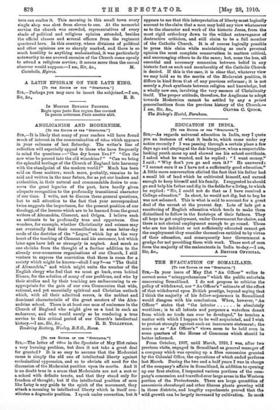ANGLICANISM AND MODERNISM.
[To TIER EDITOR 07 TM! " SPECTATOR."] SIR,—It is likely that many of your readers will have found much of interest in the communication of 03-ra which appears in your columns of last Saturday. The writer's line of reflection will especially appeal to those who have frequently in mind the questions :—" Can dry bones live ? " " Can the new wine be poured into the old wineskins ? " "Can we bring the splendid heritage of the Church of England into harmony with the standpoint of the modern world ?" Much has been said on these matters ; much more, probably, remains to be said and written in the near future, for as yet our leaders and authorities, in their natural and commendable desire to con- serve the great legacies of the past, have hardly given adequate recognition to the profoundly transitional character of our time. I write, not to discuss these general questions, but to call attention to the fact that your correspondent twice suggests the importance, for the present position of our theology, of the lessons which are to be learned from the great writers of Alexandria, Clement, and Origen. I believe such an estimate to be profoundly true and opportune. One wonders, for example, whether Christianity and science may not eventually find their reconciliation in some latter-day mode of the doctrine of the "Logos," which lay at the very heart of the teaching of Clement and his successor, but which later ages have left so strangely in neglect. And much as one shrinks from the thought of a further addition to the already over-numerous organisations of oar Church, I still venture to express the conviction that there is room for a society which might be known—shall I say ?—as " The Guild of Alexandria," and which might unite the number of the English clergy who feel that we must go back, even behind Nicaea, for the solution of many of our problems, and who by their studies and by their teaching are endeavouring to re- appropriate for the gain of our own Communion that wide, rational, and yet essentially spiritual and Christian outlook which, with all their admitted errors, is the noblest and dominant characteristic of the great masters of the Alex- andrine school. There is at least one man of eminence in the Church of England who might give us a lead in such an endeavour, and who would surely so be rendering a true service to this critical period of our Church's intellectual














































 Previous page
Previous page